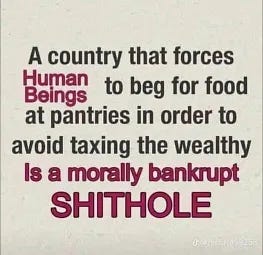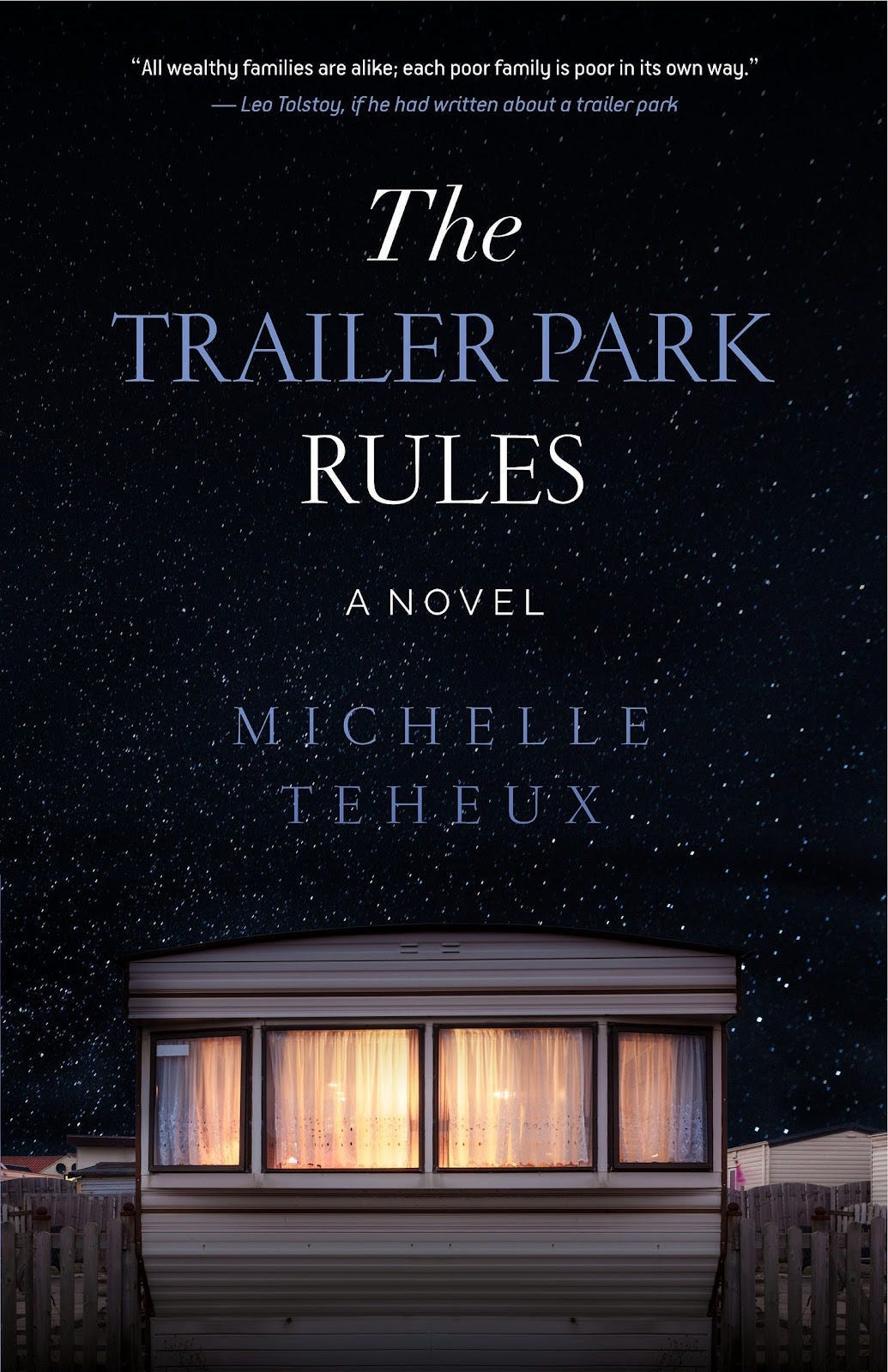The Vulgar Bezos Wedding Is a Lesson in How Inequality Works — and Who Pays the Price: (This Week’s Inequality Roundup, June 27, 2025)
Each week, Untrickled curates essential stories on inequality in America. This edition throws some cold water at the Bezos wedding.
Because my invitation was apparently lost in the mail, I did not attend the Jeff Bezos-Lauren Sanchez wedding.
I did hear it was somewhat fancier than my own wedding, for which we rented the historic park pavilion overlooking a lagoon in our town. We spent a few hundred bucks, total, and invited just our closest family and friends.
I prefer small, simple, intimate weddings, but I know a lot of people like to put on show-stoppers. That’s fine; have the wedding you want and can afford.
My problem with this wedding is that we all helped foot the bill.
But unlike the rest of us who pay our own way, Bezos' party was funded — in part — by the distorted, anti-competitive system he helped build.
Even if you have never made a single purchase from Amazon, you’re still paying the price for Bezos’ greed. As the great Cory Doctorow explains: “Amazon binds its sellers over to something called Most Favored Nation status. That means that sellers can’t offer their goods more cheaply than they do on Amazon — even if it costs them (lots) less to sell in Target or direct from their websites. This means that every time a seller adds a dollar to their Amazon sale price, they have to add a dollar to the price of their goods everywhere else, too.”
So anyway, that explains how they were able to host what was probably the most vulgar display of wealth the world has ever seen. You helped pay for it.
By comparison, recent British royal nuptials have been a mere country barn wedding.
Plenty of Brits complain about bankrolling the royals.
But supporting real royalty would be a bargain compared to what Bezos costs us all.
Pretty sure if anyone were to tell the happy couple their greed was extracting wealth from the poor, they’d flippantly suggest, “Let them eat wedding cake.”
I curate this weekly roundup of memes and analysis every Friday. Subscribe now and never miss another roundup. In addition to the roundup, I also post original work on this subject every Tuesday and Thursday. Every Saturday, look for my new feature, Poverty and Privilege. As always, if you find a new Substack you love, subscribe now!
Shared by
Shared by
Shared by
Shared by
Shared by
Shared by
Why does inequality matter?
Jeremy Ney, American Inequality
The number one reason why inequality is bad is that it reduces intergenerational mobility. This relationship, known as “The Great Gatsby Curve”, was made famous by Miles Corak in 2013 and explains that the more inequality that a country has, the less likely it is that children will make more money than their parents did. This is one of the key parts of the American Dream, that each successive generation does a bit better than the last. With high levels of inequality, if your parents are in the 50th percentile (i.e. the middle class) it is more likely that you end up in the 30th percentile (i.e. low-income).
Veterinary Medicine is Becoming a Luxury Product
Eric Fish, DVM, All Science Great & Small
Charging premium prices to fewer and fewer people is literally the definition of a luxury good! That strategy may be fine for non-essential products like sports cars and high-end clothing, but is that really the direction we want to take for healthcare? Do we want pets and vet care to be only for the affluent few, synonymous with status symbols like Birkin bags in the near future???
Don’t Bail Out the Farmers
Jessica Riedl, Edmond’s Substack
Farm subsidies remain broadly popular because Americans mistakenly believe such policies exist to protect poor, struggling family farmers from crop and weather unpredictability. In reality, farm subsidies are America’s largest corporate welfare program. The agriculture industry has undergone intense consolidation into mammoth agribusinesses, which are reaping the benefits of billions of dollars in farm aid.
MAGA Will Devastate Rural America
Paul Krugman
The first thing you need to understand is that while rural Americans like to think of themselves as self-reliant, the fact is that poorer, more rural states are in effect heavily subsidized by richer states like Massachusetts and New Jersey.
This reality makes it inevitable that the standard conservative fiscal agenda — tax cuts for the rich, benefit cuts for the poor and middle class — hurts the heartland more than it hurts major metropolitan areas. But MAGA’s Reverse Robin Hoodism goes far beyond the standard conservative agenda, in ways that will be especially devastating to rural areas and small towns.
Maybe the Working Class Isn’t What You Think
Michelle Teheux, Untrickled
Where are the think pieces exploring why many of the richest of the rich threw their support behind Trump? Why do we pretend the working class was powerful enough to tip the election? Do we even stop to think about who was spending a fortune to influence the working class and everyone else?
The working class and the billionaires do not have the same interests and should not be on the same side. What does it mean that they appear to be? It shows that the billionaires were voting for their own financial best interest and they had enough money and influence to sway others — including many working class people — to vote against their own interests.
Self-Care Is for the Rich
Michelle Teheux, Untrickled
Self-care, as sold to us today, is a capitalist hustle.
It’s another way to turn exhaustion into consumption. It’s a capitalist idea that spending money on something — a massage, a vacation, a special treat of some kind — will make you feel better. Really, what engaging in self-care does is encourage spending. You work harder to afford rest, and then you’re too tired to enjoy it.
What you really need is to work less. You need more hours with your family and friends or just reading or gardening or biking or whatever it is you wish you could do more of if you were not so busy.
Survival of the Greediest
Katie Jgln, The Noösphere
Economic inequality is often treated as inevitable and constant. There will always be winners, we’re told, and there will always be losers. And if the present feels bleak, just imagine being a penniless peasant toiling in the pouring rain while your lord feasts on roast goose and drinks his body weight in red wine. (As if having to pee in bottles so your boss can fund yet another phallic space rocket is some grand ‘upgrade’ from those times, which weren’t even as grim as we like to believe.)
But the facts of rising income and wealth inequality — and rapidly so — are hard to ignore. And few economic measures capture it quite as starkly as the yawning gap between CEO and worker pay.
Don’t miss my current special series, Poverty and Privilege, which comes out every Saturday:
Part 1, Unlikely Allies in an Unequal America
Part 2, The Country Club Lunch
Part 3, One Family’s Fall From the Middle Class
Part 4, Billable Hours Don’t Pause for Birth
About Michelle Teheux
I’m a writer in central Illinois. If you like my work, subscribe to me here and on Medium. I also have a new Substack aimed at authors who want to self-publish books, called The Indie Author. My most recent book is Strapped: Fighting for the soul of the American working class. My most recent novel is The Trailer Park Rules. If you prefer to give a one-time tip, I accept Ko-fi.
All wealthy families are alike; each poor family is poor in its own way.
— Leo Tolstoy, if he had written about a trailer park
For residents of the Loire Mobile Home Park, surviving means understanding which rules to follow and which to break. Each has landed in the trailer park for wildly different reasons.
Jonesy is a failed journalist with one dream left. Angel is the kind of irresponsible single mother society just shakes its head about, and her daughter Maya is the kid everybody overlooks. Jimmy and Janiece Jackson wanted to be the first in their families to achieve the American dream, but all the positive attitude in the world can’t solve their predicament. Darren is a disabled man trying to enjoy his life despite a dark past. Kaitlin is a former stripper with a sugar daddy, while Shirley is an older lady who has come down in the world and lives in denial. Nancy runs the park like a tyrant but finds out when a larger corporation takes over that she’s not different from the residents.
When the new owners jack up the lot rent, the lives of everyone in the park shift dramatically and in some cases tragically.
Welcome to the Loire Mobile Home Park! Please observe all rules.





















I just found out that Amazon HAS ALREADY BEEN SUED BY THE FTC!! However, the case has not yet been decided, knowing how this kind of litigation works, the case could potentially go on for years. This does not help the current customers who have been hurt my Amazon, but whatever happens will effect the future customers and it is certainly worth it for the government to pursue the case to the fullest extent possible. The main Case is currently going on in the US Dist Court, Western District of Washington. case 2:23 cv-01495-JHC, there are related cases going on in other Courts but I think this is the most important one and if you look up this case it will reference the ohter cases that are pending against Amazon.
I am not an expert on Anti Trust law in the USA however, it seems what you are describing what Amazon is doing would be a violation of the USA anti trust laws which purpose is to prevent companies whose practices constitute a "restraint of trade". While the law would only apply to purchases by people who reside in the USA and perhaps US citizens who live abroad, it still would be a important tool to prevent Amazon from doing the practice you are describing. Why has no one in the US government's anti trust department at least made a claim against Amazon for restraint of Trade, which could be prosecuted at least whether or not the government's position prevails?